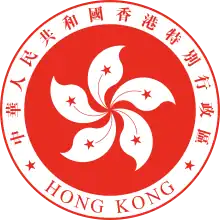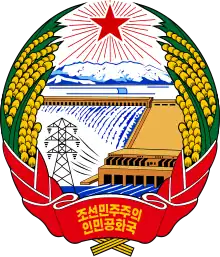Hong Kong–North Korea relations
Hong Kong–North Korea relations (Korean: 홍콩-조선민주주의인민공화국 관계) are bilateral relations between Hong Kong and Democratic People's Republic of Korea.
 | |
Hong Kong |
North Korea |
|---|---|
History
From the establishment of Democratic People's Republic of Korea in 1945 until after the establishment of the Hong Kong Special Administrative Region in 1997, there were no official relations.[1] During the Korean War and the Cold War, the two sides were on opposing sides. Hong Kong, as first a colony then a dependent territory of the United Kingdom, formed part of the capitalist camp led by the United States, while North Korea was an ally of the Soviet Union and Mainland China. Some Local Enlisted Personnel (LEP) joined with British Forces in combat in the Korean War. Hong Kong joined the embargo imposed on the communist bloc during the second half of the 20th century.
Following the transfer of sovereignty of Hong Kong to China, North Korea was able to open a Consulate-General in February 2000 by virtue of its diplomatic relations with Beijing, having previously not been allowed to establish a trade mission during British rule.[1] The Consulate General is located in Wan Chai on Hong Kong Island.
Defectors from North Korea
Hong Kong had been involved in two cases of North Korean defectors. The first was in 1996, by then a family of 16 people escaped from North Korea to Hong Kong via China. Among them five children and one pregnant woman applied for political asylum and were further transferred to South Korea.[2]
The second case was in late July 2016. A North Korean defector, who went to Hong Kong as a member of the North Korean delegation for the International Mathematical Olympiad at Hong Kong University of Science and Technology, sought refuge at the Consulate General of the Republic of Korea (South Korea) in Hong Kong, which is located on the fifth floor of the Far East Finance Centre in Harcourt Road, Admiralty, Hong Kong Island.[3] The defector eventually left for South Korea around the last week of September 2016 after staying about 80 days in Hong Kong.[4]
Economic relations
Hong Kong is the second largest trading partner of North Korea.[5] Hong Kong and North Korea cooperate in several international organisations, with a focus on social and cultural issues. Despite Hong Kong being the freest market economy in the world[6] and North Korea being a planned economy, the economic success of Hong Kong has served as a model for the development of the Sinuiju Special Administrative Region, described by its proponents as being the "Hong Kong of North Korea".[7]
Cultural and educational
In December 2016, the Secretary of Education of Hong Kong, Eddie Ng Hak-kim attended a formal meeting with the newly appointed North Korean Consul-General, Jang Song Chol, in Hong Kong. Afterward, Ng posted on his Facebook page stating that he "anticipated exchanges in cultural and educational affairs will be strengthened in the future." Ng's statement received generally negative response, being blamed that North Korean style "brainwashing" should not be a shared common ground between Hong Kong and North Korea.[8][9]
References
- North Korea's Macau-based trading venture opens its doors to deny reports of espionage and shady deals, South China Morning Post, 3 September 2000
- North Korean family defects in Hong Kong, UPI, December 5, 1996
- North Korean defects at Hong Kong’s South Korean consulate, South China Morning Post, 27 July 2016.
- North defector was holed up for 80 days, The Standard, 29 September 2016
- How did Hong Kong become North Korea’s No 2 trading partner?, SCMP, 8-10-2013
- "Hong Kong Economy: Population, Facts, GDP, Business, Trade, Inflation". The Heritage Foundation. Archived from the original on 25 January 2021. Retrieved 22 May 2015.
- "Californian May Oversee N. Korea Economic Zone". Los Angeles Times. 8 September 2004.
- 吳克儉晤朝鮮總領事 倡加強教育及文化交流 網民「嬲嬲」劣評 in Hong Kong 01, 2016-12-22
- 【網上熱話】吳克儉晤朝鮮總領事倡加強教育交流 網民「嬲嬲」大罵, Mingpao, 24-12-2016

